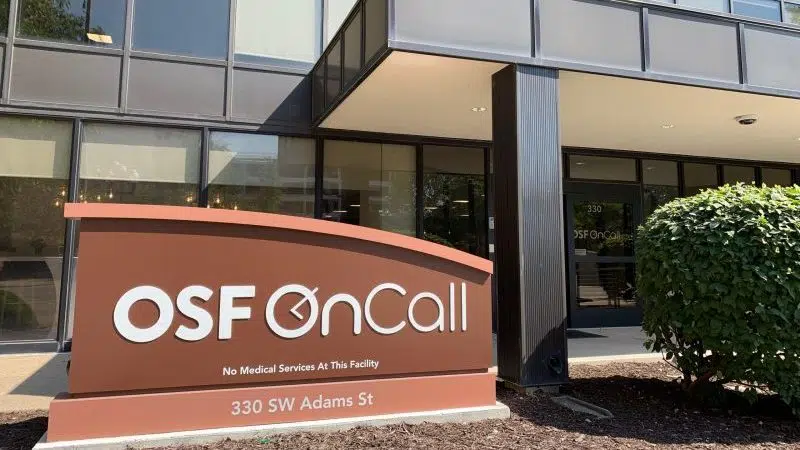PEORIA, Ill. — The OSF OnCall digital care center in Downtown Peoria opened in January and has since been providing care to patients throughout the entire process of the healthcare system.
The digital center, however, doesn’t provide care to patients in a traditional way.
It’s been described as a “hospital without walls” as nurses are able to guide patients through the entire process without ever seeing them in person.
The process starts on the third floor, where calls are directed when someone is seeking medical advice.
On an average week, the nurse triage team serves 10,000 patients throughout Illinois and Michigan.
The nurse triage serves as the early assessment part of the healthcare process, as patients feeling unwell can call with any questions.
“It can be anywhere from scheduling an appointment, to calling 911 because you’re having concerning symptoms, to somewhere in the middle,” said Director of Contact Center Clinical Operations Jennie Van Antwerp.
“[Patients] talk to one of our medical office assistants if they want something as easy as a lab result, or talk to a nurse if they need something more complex. We’re really meeting the patient where they’re at.”
The average speed of answer for a call to the nurse triage is just six to eight minutes.
Throughout the COVID-19 pandemic, OSF has partnered with the state of Illinois to provide necessities to those quarantined due to the virus or who have tested positive.
The packages contain a face mask, paper towels, laundry detergent, and other things with the hope the individual won’t have to leave their home during the quarantine period.
Patients are also given a thermometer, pulse oximeter, and a smart device to communicate with their caregiver virtually.
At the height of the pandemic, as many as 800 patients were being monitored in their homes.
In addition to providing care to patients inside their homes, the building has an ICU unit.
“We actually remotely monitor and manage patients across all of our OSF facilities,” said Director of Digital Acute Care Services Suzanne Hinderliter. “We watch over 200 patients, not only in the ICU but patients that may be in the emergency department awaiting transfer to the ICU.”
Not every facility has access to the resources that are provided by OSF OnCall.
By combining expert medical staff digitally with nurses at hospitals and other facilities, OSF HealthCare has been able to decrease the average length of ICU stay by 27%.
“It allows us to intervene earlier and to make changes in their treatment in order for them to get better faster,” said Hinderliter.
They have also seen a 20% decrease in average ICU mortality, and patients, on average, spend 1.4 fewer days on a ventilator.
Hinderliter said the virtual services were especially helpful with COVID-19 patients at the height of the pandemic, as it saved protective equipment by not having to send a nurse in to physically see a patient.
Hinderliter, who has been in the profession for 25 years, said the idea of digital healthcare was just a thought when she first entered the field.
“This was something we always thought would be a great idea but never had the technology,” said Hinderliter. “All of the pieces have aligned and allowed us to bring all of those resources together and put out these fabulous services — that years ago was something you may have seen on Star Trek.”
400 employees staff OSF OnCall on Adams St. 24 hours a day, seven days a week, 365 days a year.
OSF HealthCare hopes to expand their digital presence in the near future with more options for patients to receive care wherever they may be.




